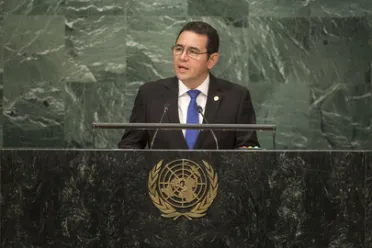Statement
Statement summary
JIMMY MORALES, President of Guatemala, recalled the Esquipulas Peace Process and the signing of the Procedure for the Establishment of a Firm and Lasting Peace in Central America. The peace accords included a ceasefire and reforms. Those reforms have greatly advanced development in Guatemala, benefiting vulnerable groups such as indigenous peoples and women. As a result of the peace processes, the rule of law had also been strengthened.
The election of the new Government was an expression of the discontent among the population, he said. A reconstruction of society was required, and transparency in governance, health care, education and development had to be improved. He emphasized his commitment to zero-tolerance for corruption. Corruption weakened institutions and hampered development. The Government had made primary education and the effective management of hospitals, nutrition and maternal health a priority. Challenges in the areas of human rights and climate change remained. His Government sought to engage further with the Human Rights Council to address those challenges.
He expressed his profound admiration for migrants in Guatemala and their hard work. Migrants were model citizens and their rights and human dignity must be respected. The Government was adamant about their protection during all stages of migration. With regard to the 2030 Agenda, he noted that it was in line with the country’s 2032 K’atun National Development Plan.
He also called for strengthened international dialogue and cooperation to prevent future conflicts in the region. Attacks and violence undermined trust. He stressed the need to maintain peace in the region and to strengthen the rule of law. Guatemala would continue to support United Nations peacekeeping missions worldwide and remained concerned about the ongoing conflicts in Syria, Mali and Sudan.
Full statement
Read the full statement, in PDF format.
Photo

Previous sessions
Access the statements from previous sessions.
